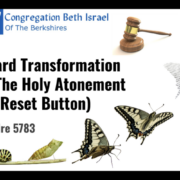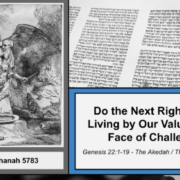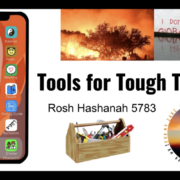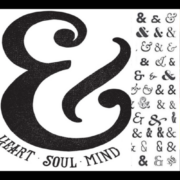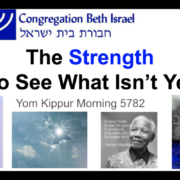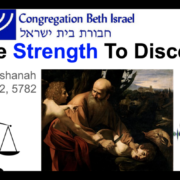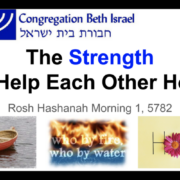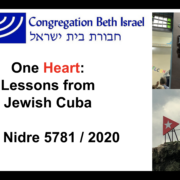On Kol Nidre, teshuvah, balance, “the holy atonement reset button,” and more.
This guest post is the D’var Torah that CBI member Ziva Larson offered at Rosh Hashanah 2 Morning Services on Tuesday, September 27, 2022.
It was the best of times, it was the worst of times.
Earlier this summer, I copied down a Chinese proverb, though an internet search suggests that this many not actually come to us from China after all! But the words resonate with me regardless: “Keep a green bough in your heart, the singing bird will come.”
(Image source: madebychook.)
Keep a green bough in your heart; the singing bird will come. Or as we heard from Mariame Kaba on Rosh Hashanah, hope is a discipline.
It feels like an apt seasonal teaching as we approach the autumn equinox and the darker months of the year. It feels even more like an apt spiritual teaching, especially in the midst of pandemic, in times when it feels like our certainties are shifting beneath our feet.
Making a space for hope in our hearts is a practice, which is to say, it takes work. We need to till the soil, plant the tree, keep the tree alive, and then the bird will come with exquisite liquid song. Hope doesn’t come because we’re lucky. Hope comes when we make a space for it.
It takes strength — gevurah — to cultivate that space in our hearts, especially when the news makes us want to close our hearts tight against anticipated loss and even against each other. It takes strength to have the vision of the singing bird that isn’t yet here, the hope that we may not yet feel, the healing that isn’t yet.
In this morning’s Torah reading we heard רְאֵ֨ה נָתַ֤תִּי לְפָנֶ֙יךָ֙ הַיּ֔וֹם / “See, I place before you today…” Yom Kippur calls us to see what has not yet come to pass — because our choices will determine which future we enter. We get to choose curses or blessings, hardened hearts or opened ones, despair or hope.
In a sense, the whole of 5782 is an opportunity to pause and see what isn’t here yet.
Torah teaches that every seventh year should be a shmita year: a year-long Shabbat for the land. We’ll learn more about that later this year (so stay tuned for updates on study and action opportunities this winter and spring). As the climate crisis intensifies, how will our choices and our policies and our culture lead us to care for our planet? How can we not only keep a green bough in our hearts, but also preserve and protect the ecosystems of our planet… especially now, when everything feels so broken — when everything is so broken?
Our mystics teach that at the first moment of creation, there was breaking. God’s infinite light was too powerful to be contained. The initial vessels created to hold that light didn’t have enough structural integrity, enough gevurah, and they shattered. So God tried again, and the second time, creation “held”… but shards of those broken first vessels remain. There is brokenness everywhere we look, and that’s not new.
Our mystics also teach that we have an integral role to play in repairing the world’s brokenness. When we do mitzvot, we uncover the hidden sparks of primordial light buried beneath the shards, and we lift them back up to their Source. We repair the world. We repair God, as it were.
I love this teaching for two reasons. First: it doesn’t sugarcoat the brokenness. Things are broken — between global pandemic, and inequality and racism and xenophobia, and the climate crisis, and assaults on civil rights and on our democracy — and our religious tradition is not going to pretend that away.
And second: it empowers us to bring repair. This is our task as Jews and as human beings in the world. We lift up sparks every time donate to the food pantry, or welcome a refugee, or help someone with a uterus get the healthcare they need… and every time we light Shabbat candles or pray or sit in a sukkah, because those mitzvot nourish our souls, and we need that, too.
In the words of the sage Leonard Cohen, “There is a crack in everything: it’s how the light gets in.” We need to see the cracks, the broken places, because pretending them away is spiritually dishonest. And the cracks are also how we see the light shining in. Being able to see both what’s broken, and what repair could look like and how we can get there, takes gevurah.
Some of us don’t like looking at what’s broken. I get that. It’s painful for me too. I struggle most when the brokenness is something human beings created or perpetuate.
What brings me closest to despair is the knowledge that a year ago, we stayed apart to protect each other. There was no vaccine for COVID-19. Today we are vaccinated: honestly miraculous! But because so many people believe the lies — that COVID is a hoax; that masks don’t offer protection, or that they’re a form of government control; that the vaccines aren’t safe, or that they’re a form of government control — the Delta variant is raging. Misinformation and disinformation and outright lies are so prevalent that thousands are once again dying every day. Facing all of that takes gevurah.
Some of us have trouble seeing beyond what’s broken. I get that too. The brokenness is so vast it can seem insurmountable. Facing what’s broken without becoming consumed by that brokenness also takes gevurah.
For me the spiritual question is: what are we afraid of? What are we afraid will happen if we face the brokenness in our communities, in our nation, in our world? And what are we afraid will happen if we allow ourselves to cultivate hope for better?
I suspect we’re afraid of facing injustice because we’re afraid of despair. I feel that. I know that if I let myself see those things clearly, I am going to need to ask: what am I willing to do in order to create change, and what am I willing to give up to make space and time for that work?
And I suspect we’re afraid to let ourselves hope because we don’t want to be disappointed. If hope is something that just happens, without any agency on our part, that fear makes some sense — hopes can rise and hopes can be dashed and either way it’s not up to us. But in Mariame Kaba’s framing, hope is a discipline. Which brings me back to our mystics and their teaching that when we do mitzvot, we lift up fallen sparks. Doing mitzvot also is a discipline, a practice. Jewish tradition calls us to do mitzvot, recognizing that in the doing we might rewire our souls and even heal God. And even if we don’t feel changed, doing mitzvot still makes the world a better place.
See, I place before you today blessing and curse, says Torah. The Hasidic master known as the Me’or Eynayim points out that good and evil have been mixed together since the beginning of our human story, and they are mixed together within us, too. Our task, he says, is to empower our innate goodness. I think he means something like: our morality, our integrity, our attachment to truth. Translator R. Art Green notes that our moral disposition affects how we see the world, especially the actions of others. A tzaddik (a righteous person) is someone whose own goodness causes them to see the good in others, and therefore to treat others with compassion.
It takes gevurah to see the best in others, not just one time but as a constant practice. If someone stands me up for a meeting, I could think, “ugh, they don’t value my time, I don’t want to engage with them,” or I could choose to think, “Hm, I wonder what’s going on with them; I should check in and make sure they’re okay.” Halakha (Jewish law, our tradition’s sacred path) asks us to do the second of these: to give each other the benefit of the doubt. Seeing each other through generous eyes takes gevurah! And…how we see each other can impact what actually is.
There are a few people in the world I wouldn’t want to sit down with until they did their work, repaired their harms, and showed themselves to have changed. But in most cases, we’re what Hasidic tradition calls beynonim — in-between-ers. We’re not perfect, and we’re not terrible: we’re somewhere in between. It’s in that in-between space that I think we can make the greatest difference by giving each other the benefit of the doubt, seeing each other through generous eyes. This isn’t a Pollyanna move. It asks a spine of titanium alongside an open, curious heart.
It takes gevurah to build relationships when we disagree, identifying common ground while holding the reality of our differences. It takes gevurah to balance generosity of spirit with holding each other (and ourselves) accountable. It takes gevurah to discern when we should “grade on a curve” and when we should demand better from others and ourselves. It takes gevurah to see each other, and the world, into being better than we have been before.
Mariame Kaba asks, “what’s the next best thing you can do from where you are?” Not “how are we going to fix everything,” but what is the next good thing we can do from where we are.
Envision a better world, and take one step closer. And then another. As our sages teach, “It is not incumbent on us to finish the task, but neither are we free to refrain from beginning it.”
It’s tempting to imagine that if we could just feel hopeful, then we’d be energized to repair the world. But I think that’s backwards. Our job is to see what hasn’t yet come to pass — the good that isn’t here yet — and then live it into being. We lift up the sparks, we look for the good in each other, we envision a better world and take one step closer to it, because those actions are how we cultivate the ground of our hearts to sustain the green bough where hope can make its home.
This is the sermon Rabbi Rachel offered at CBI on Yom Kippur morning (cross-posted to Velveteen Rabbi.)
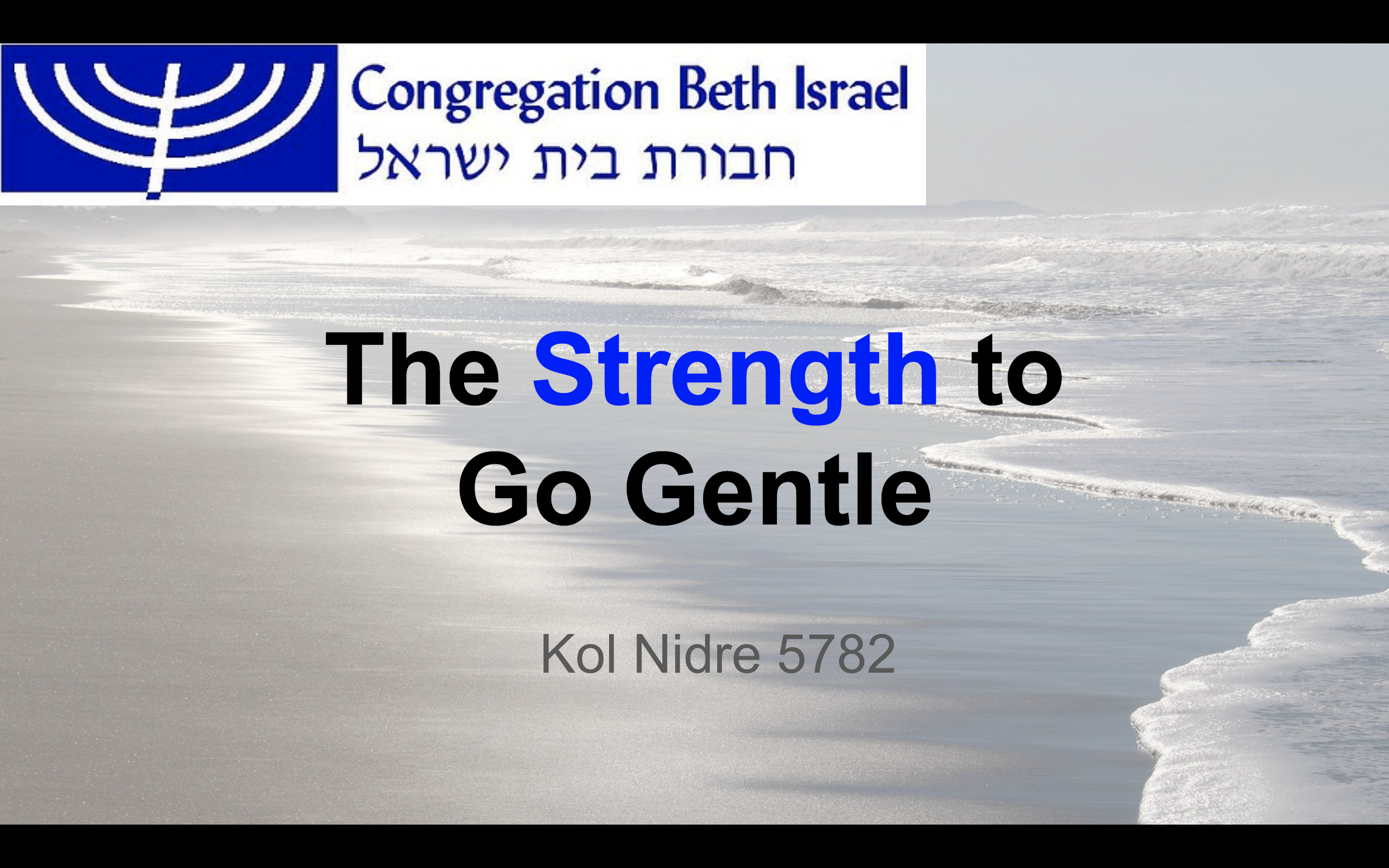
Did you know that Shakespeare wrote King Lear while quarantining for possible exposure to the Bubonic plague? Possibly also Macbeth and Antony and Cleopatra. I assume all of us wrote at least one great masterwork of literature during the last year. No?
Surely at least we started baking with sourdough during the pandemic, creating spectacular loaves and sharing them on Instagram. Or maybe we reorganized our entire storage system, or finished all the home improvement projects we hadn’t had time to complete before, or learned a new language on Duolingo.
The idea that we were “supposed” to do something great and meaningful during quarantine has become a meme, a running joke. As though that were the way to “win” at lockdown and isolation amid global pandemic. We laugh, but the laughter is uneasy. On some level, maybe we wonder: if I didn’t spend this first 18 months of pandemic doing something I can brag about, am I doing it wrong?
Kol nidrei: all the vows and promises and oaths that we fail to live up to…
Maybe we promised ourselves that 5781 would be the year we would finally start working out, or the year we would actually open those cookbooks, or the year we would learn to bake sourdough or write a screenplay… especially since many of us were sheltering-in-place or working from home, so obviously we had all that spare time, right? And instead it turned out that 5781 was a year that we spent trying to keep ourselves and each other afloat. It was a year that we spent watching millions die, and grieving, maybe grappling with survivor’s guilt. And it was a year that we spent watching some people politicize mask-wearing and vaccination, even questioning whether or not the virus is real.
In some ways, the jokes about sourdough and King Lear feel like gaslighting. They ask us to pretend away the inconceivable awfulness of what we’ve witnessed in the last year. ICUs filling with COVID patients again and again. Crematoria in India working overtime. Vaccine shortages in Asia and Africa, paired with vaccine refusers in our own country. And the climate crisis. And the assault on democracy. Our grief and our fear and our compassion have been in overdrive for so long: many are exhausted, or numb, or overwhelmed. And yet somehow we’re supposed to imagine that we’re supposed to ignore our heartbreak and fear and be productive, and if we failed at that, we’ve missed the mark? As though we needed another reason to feel lousy about ourselves tonight!
But feeling lousy about ourselves misses the point of today altogether. Yes, the liturgy of Yom Kippur reminds us that we missed the mark. Even if we’d spent every minute of the last year trying to pursue justice and act with compassion, human beings make mistakes. But the point isn’t self-flagellation, it’s promising in community (and as a community) that we will try to do better.
My image of God is not the angry teacher who can’t wait to give us demerits for all of our flaws. Yes, we’ll spend these 25 hours searching our souls to find the inner work we need to do to be better. But that’s because our tradition gives us this holy season for introspection, calling us to become — not because God is poised to whack us with a ruler. On the contrary. As we heard right after Kol Nidre, “vayomer YHVH, salachti kidvarecha!” And God says: I forgive you, as I said I would! We use the spiritual tools of prayer and contemplation and song to open our hearts so we can feel that forgiveness and be ready to try again.
This year, I also imagine God saying: hey, be gentle with yourselves. One of my friends said to me, at the start of the long cold pandemic winter, that she was grading herself on a curve this year. Some days she felt able to be productive. Other days, it was all she could do to get through the day. And on those days, she gave herself permission to be as she was. What she called grading on a curve, I think of as being gentle with ourselves.
In times of intense grief, clergy and therapists both say to lower the pressure we put on ourselves. I learned this anew when my mother died and grief fogged my vision. When we’re living with sorrow or uncertainty or trauma (or all of the above), just making it through the day can take all we’ve got. Over the last 18 months of pandemic, we’ve all been in that place, sometimes.
Every year at this season we take a good hard look at our failings, and it’s easy to get stuck there — maybe especially this year. Maybe we didn’t take care of ourselves, or we ate and drank too much. Maybe we gave in to despair and doomscrolling, or we turned a blind eye to the world’s suffering…
Jewish tradition calls us to look clearly at where we missed the mark, and it also calls us not to cling to our perceived shortcomings. God is always ready to forgive. That means that God also forgives us for not baking Instagram-worthy sourdough or writing a novel or becoming fluent in Hebrew during this second pandemic year.
Tonight asks us to hold two competing truths in balance. One: Jewish values demand that we constantly work toward justice and healing for this broken world. And two: when we really make teshuvah (when we turn ourselves around, when we do our inner work), God forgives all of our failings. We need to be able to forgive ourselves.
That doesn’t mean there are no standards and anything goes. Gevurah — our theme for this year — asks us to maintain accountability for ourselves and for others. There are behaviors that are simply not okay. Torah is clear that lying, or cheating, or turning a blind eye to the suffering of others is flat wrong. Tomorrow afternoon’s Torah reading will remind us that God asks us to feed the hungry and care for the powerless, to pursue justice without bias, to love our fellow human beings. That Torah reading also reminds us to offer tochecha, corrective words, if we see our fellow human beings acting unethically — because if we let unethical behavior stand, we become complicit.
And it is also a spiritual truth that sometimes it’s all we can do to get out of bed in the morning. When we’re living with uncertainty or trauma or grief, even the simplest tasks can be monumental. Sometimes we can’t offer tochecha or work toward justice because just completing life’s requisite tasks takes all we’ve got. And that’s okay.
Gevurah also can mean healthy boundaries. Sometimes the boundary we need to draw is one that says: I’m doing the best I can, and this is all I can do, and for now it’s going to have to be enough.
This is part of why we live in community. At any given time, some of us are struggling just to make it through the day. In these times of pandemic and climate crisis, that may be even more true than it used to be. We need to help each other through and remind each other that putting on one’s own oxygen mask first is not only okay, it’s necessary. And at any given time, some of us are doing well enough to make things better for someone else. That’s when it’s our job to be angels for each other, as I said on Rosh Hashanah.
So let’s go gentle into this Kol Nidre night. Let’s promise to help each other through the challenges of 5782. Let’s refrain from comparing ourselves to other people, even if their sourdough loaves look magazine-worthy. And let’s show up with open hearts and commit ourselves to trying to be better, because that’s what we’re here for.
God can forgive us for barely holding it together — even for not being “productive” during the pandemic. Can we forgive ourselves?
This is Rabbi Rachel’s sermon for Kol Nidre this year (cross-posted to Velveteen Rabbi.O)
On Sunday evening I offered a tiny pearl of introduction to this year’s high holiday theme of gevurah. Yesterday morning we talked about the strength it takes to help each other find hope.
Today our exploration of gevurah comes via the Torah reading for this morning.
Our mystics taught that God’s infinity is revealed in creation through a series of sefirot, divine qualities or emanations. These are the channels through which God’s infinite energy flows into the world, and we associate each one with a quality that we and God share. Like chesed, lovingkindness — last year’s high holiday theme. And gevurah, boundaries and strength and power and discernment — this year’s theme.
When our mystics look at the figures in Torah, they associate different characters in Torah with each of the sefirot. Abraham is associated with chesed, lovingkindness. His tent was open on all sides, he rushed to prepare a feast for visitors, he represents flowing love. And his son Isaac is associated with gevurah.
One of the reasons why Isaac is associated with this spiritual quality is surely the story we just heard, the “binding of Isaac.” How do we see Isaac’s strength in this story? Arguably, what we see is him holding still and letting himself be bound. Maybe he feels powerless, or overwhelmed, or out of control: we don’t know, because Torah doesn’t tell us! But to me, his gevurah has a kind of stoic, silent perseverance to it. He holds still and trusts that he will make it through somehow.
Abraham showed tremendous gevurah earlier in Torah. In midrash, we learn that his father was a builder of idols, and young Avram smashed them. It’s a great story: Terach comes home, all of the idols in his shop are smashed save one, and the biggest one has a stick in its hand. And he yells, what did you do?! and Avram says, “oh, it wasn’t me, dad, the big one did it.” And his father says, “You know they’re just stone. They can’t move!” and Avram retorts, “so why do you worship them, then?” It took gevurah to stand up to his dad.
Or earlier in Genesis, when God disclosed intentions to destroy Sodom and Gomorrah. Remember, Avraham pushed back: what if there are fifty righteous there, what if there are forty, all the way down to ten. But when it comes to Sarah casting-out Ishmael in yesterday’s Torah reading, Avraham doesn’t do much. He tells God he doesn’t like it, but he doesn’t challenge it. And in today’s story, God makes an outrageous request and Avraham just… does it. As Rabbi Danya Ruttenberg notes, he’s a hero when it comes to the outside world, but with his own sons, he falls far short of offering the protection they need.
One of my favorite ways of reading Torah is to place ourselves in the shoes of everyone in the story. Through the lens of Torah we can see ourselves refracted in new ways. And in empathizing with everyone in Torah’s story, we strengthen our capacity to stand in the shoes of another.
How does it feel to empathize with each figure in today’s story, to feel-into where they are?
Maybe Isaac’s kind of gevurah resonates for us, eighteen months into this pandemic. The pandemic has highlighted so many ways we aren’t in control. We don’t have the power to make COVID-19 go away, and we don’t have the power to require other people to do what’s right. But we can use our strength to accept our circumstances and make the best of the hand we’re dealt.
Isaac must have also felt fear. His father had the knife raised for the strike before the angel intervened. We too feel fear in these pandemic times. What might it mean to follow in Isaac’s footsteps and do what life’s situation asks of us, even when we feel afraid?
I don’t especially want to empathize with today’s portrait of Avraham. But like Avraham who followed instructions in today’s story, we too hear voices — day and night, over the internet and cable news and social media — telling us what to do and why. We may be more like Avraham than we want to realize.
Today’s Torah reading begins with the words, “After these things, God tested Avraham.” in English we call this the “Binding of Isaac,” but Torah calls this a test. I’ve always felt that Avraham failed the test: he should have pushed back. He didn’t exercise the discernment to recognize that God’s instruction here was wrong. Discernment is part of gevurah, too.
Gevurah asks us to discern when the voices we’re listening to are giving us good advice and when they’re not. Sometimes the voices we hear are self-serving or toxic. Some voices today declare that the masks we wear to protect against airborne infection are “muzzles” that take away our freedom. Other voices proclaim that as human beings in a society we have a responsibility to take care of each other. What voices will we heed in 5782?
Recently, as I was studying this story again, my son asked me what I was learning. His Hebrew name is after my maternal grandfather, Isaac — in Hebrew, Yitzchak, the name of the son whom Avraham almost sacrificed. I realized he didn’t really know this story yet. So I told it to him, in outline, curious to know how it would land with him.
(And yes, he gave me permission to tell this story to you today.)
His first reaction was: God — He, or She, or They — probably isn’t giving us the full story here. “God is giving us pieces and parts to figure out for ourselves, but God might overestimate or underestimate us.” And then he said, “Loyalty to God is a good thing, but Abraham could have found a loophole. We have choices. We need to feel in our jellies when we’re treating people wrong or making a wrong choice.”
I said, “You mean, we need to learn to use our discernment?” Yes, he said. That’s a good word for it.
We need to use our discernment to know when the voices we’re following are aligned with our highest values — and when they’re not. Discernment is another way of saying, gevurah.
It’s also noteworthy who’s not in this story. Sarah appears nowhere in this part of the narrative. The next thing we read, after this story, is that Sarah died at 127. From that juxtaposition one midrash imagines her hearing the news from afar, perhaps in a garbled form indicating that her husband actually sacrificed their son, and dying on the spot.
After the way we saw Sarah behave yesterday — banishing Hagar and Ishmael into the desert — I don’t especially want to empathize with Sarah, either! But when I place myself in her shoes, I can feel her grief and horror at the news of her child’s death. (Of course, that news turns out to be wrong. Fake news, as it were. But she still grieves — and dies.)
It takes gevurah to place ourselves in someone else’s situation. It takes gevurah to rein in our own reactivity so we can empathize with someone’s heartbreak even if their past behaviors made us angry. Empathy might seem like an expression of chesed, lovingkindness — but I think it requires our gevurah.
Maybe this feels a little bit uncomfortable. Maybe we don’t want to empathize with people who we perceive made bad choices. That’s a very human response. To our ancestors, it was also an angelic one!
We see this in a midrash on part of the Exodus story. When we crossed the sea, Talmud says, the angels rejoiced when the waves crashed in and washed away the Egyptians. This is Pharaoh and his army we’re talking about. They had caused unimaginable suffering. And God says, “the works of My hands are dying, and you want to sing praises?!” Like — what’s the matter with you; develop some empathy, would you?! For this reason we pour out drops of juice or wine, symbol of joy, from our second cup at seder. We diminish our joy because someone else suffered in our journey to liberation.
Not wanting to empathize with someone we don’t like or don’t agree with is a very human reaction… and that midrash comes to teach us that Jewish values ask us to rise above that reaction.
Gevurah is how we balance between feeling our righteous anger, and reining in our anger so that we don’t lose empathy. Gevurah is in how we exercise judgment, especially when it comes to which voices we will heed and amplify. Gevurah is in the strength to be still and trust sometimes, and the strength to take bold action sometimes, and the discernment to know which times are which.
And gevurah is what allows us to be alert for possibilities of hope that we hadn’t previously considered — like the ram that appears at the last second in today’s Torah reading, the source of hope that was waiting just outside our vision’s frame.
This is Rabbi Rachel’s d’varling from the second morning of Rosh Hashanah (cross-posted to Velveteen Rabbi.)

(Note: the first part of this sermon is adapted from an article that JTA asked me to write. Then it goes off into new territory — expanding and completing the ideas I articulated for JTA.)
All summer long, I struggled to find the words for this sermon.
The enormity of what’s broken in the world feels paralyzing. Unprecedented heat and wildfires, a flaming oil spill turning the Gulf of Mexico into an inferno, and extreme flooding across Europe and China and Louisiana and New York: “Who by fire, who by water” lands differently this year. Dayenu, that could be enough — and there’s more.
The past eighteen months were hard even for those of us who have it easy (a job, a place to live, no illness). For many the isolation was crushing, or numbing. For many without stable income or a roof overhead, the pandemic has been unimaginably worse. So too for frontline workers and those who jobs are “essential” and often unseen.
When vaccines became available, my heart soared on wings of hope. I felt certain we would be together safely at Rosh Hashanah this year. But I hadn’t reckoned with the power of social media influencers lying about the putative risks of the vaccine, or lying about the virus. The New York Times reported recently that disinformation is now a booming business. As a result, countless thousands are now refusing vaccination, claiming “personal freedom” at the expense of the collective good.
I keep thinking of the parable of the guy in the boat drilling a hole under his own seat. He doesn’t seem to notice that his personal freedom is going to drown everyone else. As a parable, it’s tart and a little bit funny. In real life, it’s horrifying. Dayenu: that too could be enough to spark despair. And wait, there’s more.
Several governors have made it illegal for municipalities to require masks. To many, masks have become a symbol of government control. To me, a mask is literally the least we can do to protect the immunocompromised (and children.) Refusing to wear a mask during this pandemic is like leaving your lights on during the London Blitz.
Between the anti-maskers, and the anti-vaxxers, and the new Delta variant, cases are rising again. We’re facing another long winter of mounting death counts — and it didn’t have to be this way.
Between what we’re doing to our planet (disproportionately harming those who are most vulnerable), and the impact of anti-maskers and anti-vaxxers on public health (ditto), and the persistence of the Big Lie that the presidential election was “stolen,” it’s hard not to despair. How could I write sermons from this place? I’m pretty sure no one comes to High Holiday services to hear their rabbi say she’s given up.
I poured out my heart about this to my hevruta partner, who reminded me that in Torah even God despaired of humanity sometimes. When God despaired of us, it was our ancestors’ job to push back and remind God of reasons to hope for humanity’s future. This is part of why we live (and learn!) in community: to help each other find hope when our hearts despair.
Our Torah readings for today and tomorrow cue up that inner journey. We just read about the casting-out of Hagar and Ishmael, a tale of how jealousy almost caused a child’s death in the desert. Tomorrow, the stakes may feel even higher with the binding of Isaac. And yet these same Torah stories also remind us of hope in tough times. An angel opens Hagar’s eyes to a flowing spring, and she and her son are saved. An angel opens Abraham’s eyes to the ram caught in the thicket, and Isaac’s life is spared.
The Days of Awe open the door to new beginnings, even when (or especially when) we can’t see our own way back to hope for change. Our job is to be be those Biblical angels for each other: helping each other reach the hope a that we can’t find alone.
Our Torah stories for Rosh Hashanah are stories of courage and strength. Hagar needed courage and strength when she set out into the wilderness with her son and a single skin of water on her back. Isaac needed courage and strength when he lay down on his father’s altar on the mountaintop. In Hebrew, one word for this kind of courage and strength is gevurah: our theme for this year’s Days of Awe.
We’ve seen a lot of gevurah in this difficult year. In the firefighters battling horrific blazes across the Pacific Northwest and California and Turkey and Greece — in the doctors and nurses working in every covid ICU — in the police officers who defended the US Capitol from an angry mob. Those are extraordinary forms of strength and courage.
I want to name and uplift a different kind of gevurah. I mostly didn’t watch the Olympics this year. (That’s not the courageous part.) I just couldn’t get excited about the pageantry or the competition this time around. But Simone Biles caught my attention even so.
Everyone seems to agree that she’s one of the most extraordinary gymnasts of all time. I can’t do a cartwheel to save my life, so I think all gymnasts are pretty amazing, but I can see that she’s more amazing even than most of her peers. And right before the individual all-around gymnastics competition, she withdrew from competition in order to focus on her mental health.
It takes courage to say I’m not okay right now, and I need to do some inner work so I can get where I need to be. A lot of us are not okay right now. Global pandemic, an almost unthinkable amount of death, the climate crisis, the rise in misinformation, the deep divisions in our body politic — the world is not okay right now.
Simone Biles said she “got the twisties,” a condition in which an athlete loses their spatial awareness and can’t tell up from down. Given the kind of literal acrobatics involved in Olympic gymnastics routines, losing her spatial awareness could be deadly. But reading about it, I realized it’s an apt description of how a lot of us are feeling emotionally and spiritually. We’ve lost access to some of the certainties that oriented us. It’s hard to trust in things that used to seem stable. I think we all “have the twisties” a little bit this year.
I’m going to go out on a limb and speculate that none of us can do the gymnastics routines that Simone Biles can do. But all of us can follow the courageous example she set. And she didn’t make that decision in a vacuum. She said she was inspired by Naomi Osaka, the pro tennis player who withdrew from the French Open in order to tend to her mental health. Using our Torah metaphor, Naomi Osaka was Simone Biles’ “angel” — the messenger whose words and actions helped Simone admit that she wasn’t okay and begin to work toward healing.
Because here’s the thing: we’re not in this alone. Even if we feel fundamentally alone sometimes, we have each other. This is why we live (and learn) in community: so we can help each other find the flowing spring that will sustain us in the wilderness, or the ram whose presence will save the day, caught in a thicket just beyond where we ourselves can see. We live in community so we can inspire each other to hope and to build. We live in community so we can strengthen each other.
The activist Mariame Kaba offers some deep wisdom about hope. “Hope doesn’t preclude feeling sadness or frustration or anger,” she says. “Hope is not optimism. Hope is a discipline.” She goes on to say:
Hope is a discipline and… we have to practice it every single day. Because in the world which we live in, it’s easy to feel a sense of hopelessness, that everything is all bad all the time, that there is nothing going to change ever, that people are evil and bad at the bottom. It feels sometimes that it’s being proven in various, different ways, so I get that, so I really get that. I understand why people feel that way. I just choose differently. I choose to think a different way and I choose to act in a different way.
When she says hope is a discipline, what I hear is that it’s a practice — like a yoga practice or a spiritual practice. And the more we practice it, the stronger we become. She names this as a choice: we can choose to let despair overwhelm us, or we can choose to strengthen our hope. This, too, is gevurah.
5781 was not an easy year. I don’t know what 5782 will bring, but I’m pretty sure the challenges of the old year will follow us into the new one. What can we do for each other to give each other courage, to help each other hope? Jewish tradition teaches that even those who receive tzedakah are also obligated to give it. In other words: even if I’m in need of assistance myself, I’m obligated to give what I can to someone else in need. I love this because it breaks down the binary between giver and receiver. And it works as a teaching about intangibles, too. Even if I need emotional support, I can still offer support to others.
Helping others is part of Jewish spiritual practice. Focusing on “ugh, who’s going to help me through this” sometimes is normal, but it’s also self-centered, and it can lead to feeling more alone. Focusing instead on “how can I help someone else” lightens our hearts. Helping others is good for the soul. If you prefer, here’s a social science framing: studies show that when we help others, we feel more energetic, stronger, and more hopeful! And that’s true whether we’re doing organized volunteer work, or “just” offering a listening ear over the phone or Zoom.
Helping each other cultivate hope does not change the realities of pandemic or injustice or fires and floods. But it can help us be resilient in the face of those realities. It can help us make meaning in the face of those realities. This is our work: to use our gevurah to support and uplift and strengthen each other, so that together we can resist despair and keep working toward a better world.
This is Rabbi Rachel’s sermon from the first morning of Rosh Hashanah (cross-posted to Velveteen Rabbi.)
[youtube https://www.youtube.com/watch?v=EpWpqQBiaWI]
I gave my sermon “live” on Zoom in realtime, and also pre-recorded it to go live with this blog post around the time I was offering it. If you prefer to watch the sermon, it’s above (and here on YouTube.) If you prefer to read it, the text appears below.
A few weeks ago, a congregant said to me: you know, it’s weird. Sometimes, especially reading Facebook, it feels like life is normal. We’re seeing everybody’s first day of school pictures, even if school is “from home” this fall. There are pictures of new kids or grandkids. Life seems to be continuing. And then other times I wake up and I’m immediately swamped by fear about the future of democracy, despair about the pandemic, and anxiety about totalitarianism, and nothing feels normal anymore at all.
I was really struck by that description of the disjunction between first-day-of-school pictures and creeping anxiety about what our world might be becoming.
I think we’ve all been living in that disjunction. It’s a normal day — and here are the latest case numbers in the global pandemic. It’s a normal day — and the news headlines are so outrageous that I feel numb. It’s a normal day — and nothing feels normal at all… As Rafia Zakaria wrote recently, “We live constantly with the weight of these juxtapositions between the banal and the utterly devastating.”
In pastoral conversations over the last six months, I’ve heard a lot of anxiety. About illness and covid-19 and our children and everything that’s happening in our world. About the coming election, and fears of authoritarianism, and the future of democracy, and a sense that everything could be about to unravel right before our eyes, and about whether this nation is a safe place to be Jewish, and whether anywhere in the world is safe. Colleagues who are therapists tell me they’re hearing all of these anxieties, too.
Several of you have asked me: if things really are that bad, then what can we do?
Here’s my answer: if things are really that bad, then we take care of each other. We protect the most vulnerable among us. We stand up for those who are more at-risk than we are. And we cultivate hope for a better world, and do what we can to get closer to that ideal in our lifetime.
And what if things aren’t that bad? If our democracy is actually pretty robust, and there isn’t going to be a civil war, and we’re not staring down the barrel of totalitarianism, and modern medicine finds an excellent vaccine for covid-19 and good government policies make it available to everyone, and together we can pursue the dream of a more perfect union with liberty and justice for all?
My answers don’t actually change.
We still need to take care of each other. And protect the most vulnerable among us. And stand up for those who are more at-risk than we are. And cultivate hope, and do what we can to build a better world. That’s our responsibility as Jews and as human beings, in the worst of times and in the best of times.
Over the last year, several friends and I have been studying the writings of the rabbi of the Warsaw Ghetto, R’ Kalonymus Kalman Shapira, sometimes known as the Piazeczyner.
The Piazeczyner was writing under incredibly difficult circumstances. The community he served was confined to the ghetto and their rights were being continually diminished. (Eventually, of course, they would be rounded up and taken to the camps… though he didn’t know that when he was writing these weekly commentaries.) Although he wrote these divrei Torah some eighty years ago, I have found his words to be deeply relevant to the spiritual needs of this moment.
The Piazeczyner writes that when times are tough, we feel “exiled” or distant from God, and those times are precisely when we feel the most powerful longing for God. (Aish Kodesh on Shabbat Ha-Gadol, 1941.) I think we can understand this as: when times are tough we despair, and we feel frightened about the world around us, and we yearn for safety and hope.
And, he says, when we “accept the yoke of the mitzvot” — when we accept our obligations to each other and to God — we grow in holiness. And when we do, it’s as though God’s own self becomes greater and more active in the world, because in our spiritual growth we become greater and more active in the world.
He could have said, these are terrible times. The world is broken, and we are not safe, and God has abandoned us. Instead, he said: the world is broken, that very brokenness arouses our yearning for a better world, and our yearning is the first step toward making it real. He said, remember the Exodus from Egypt. Remember the story of walking into the waters of the sea. Only when the waters reached our nostrils did the seas part.
The story of crossing the sea reminds us that we have to keep going “day and night.” We have to keep trying, and doing mitzvot, and building a better world. Even in times of pain and fear. Even — he wrote this in 1940 — when we’re confined to home and “commerce is brought to a standstill and businesses are closed, God forbid.” (Aish Kodesh on Beshalach, 1940.)
Torah tells us that when our spiritual ancestors wandered in the wilderness, a pillar of cloud went before us by day and a pillar of fire by night. The Piazeczyner teaches that this isn’t just a literal teaching, but also a spiritual one. The fire that we need to light our way forward is here for us, if only we will open our eyes. We need to hold on to our Source of strength and hope, and that will carry us through. In the words of Psalm 27, which we read each year at this season, “Keep hope in the One. Be strong and open your heart wide, and keep hoping in the One!”
I know that for some of us the word “God” is … complicated. Maybe we don’t believe in a God Who will step in and save us. Early in the pandemic, my son overheard me studying the Piazeczyner late one night with some colleagues. We were reading a commentary on how when the Israelites cried out in the hardships of slavery, God heard our cries and saved us. And my kid came into my study and said, “Mom, if we’re still the children of Israel, why isn’t God saving us from covid-19? Are we just not crying out enough?”
So we talked about whether God reaches into the world and changes things for us, or whether God acts in the world through our actions, or whether we find God — as Mister Rogers famously taught — “in the helpers,” in the doctors and nurses and scientists working to help people with covid-19. And I remember thinking: this may be the moment when his childhood theology falls away.
Even so, the psalmist’s instruction to be strong, open our hearts, and keep hoping is good spiritual medicine. And so is the Piazeczyner’s reminder that we have the inner resources to get through even the most difficult of times — and that the “yoke of the mitzvot” makes us responsible for and to one another. The mitzvot ask us to “be the helpers.”
As my friend and study partner Rabbi David Markus teaches, love is an action, not just a feeling. This is why the mitzvot commit us to taking care of each other: because love reaches its fullest potential when we not only feel, but also act.
Memory too is an action. The traditional silent Yizkor memorial prayer includes an explicit invitation to act. It says that we will give tzedakah in the memory of those who have died: tzedakah, not “charity” but a kind of giving that is rooted in tzedek, justice. (The version of the prayer we will say this morning pledges to “live justly and lovingly” in their memory.) That’s the Jewish way to remember: giving, and justice, and action.
Ruth Bader Ginsburg z”l died on the cusp of Rosh Hashanah. During these Ten Days of Teshuvah many of you have shared with me your grief at her passing, and your heightened fear of rights being eroded now that she’s gone. I feel those things too.
Justice Ginsburg will be remembered for standing up for the rights of women, from the right to have a credit card in my own name to the right to control my own body. She’ll be remembered for dissenting against stripping federal protections from voters of color. She’ll be remembered for asserting the full humanity of people with disabilities. What kind of giving, justice, and action might we undertake in her memory?
In the days since her death, I keep returning to these words that she offered to law students:
If you are going to be a lawyer and just practice your profession, you have a skill—very much like a plumber. But if you want to be a true professional, you will do something outside yourself, something to repair tears in your community, something that makes life a little better for people less fortunate than you.
That’s our Jewish obligation and our human calling: to do something that makes life better for people less fortunate than we. That obligation feels more important than ever before.
So many of the prayers we recite today are written in the plural: not “I,” but “we.” Torah also frames our obligations to each other in the plural. No matter what comes, we have responsibilities to each other.
Whether or not the world is spiraling out of control, our work of repairing the world, caring for the vulnerable, and pursuing justice doesn’t change. And maybe in fulfilling our obligations to each other, we can become for each other the pillar of fire that the Piaceczyner evoked: a beacon shining in the darkness, lighting each others’ path.
This is Rabbi Rachel’s Yom Kippur morning sermon (cross-posted to Velveteen Rabbi.)
[youtube https://www.youtube.com/watch?v=lwH0sNVtr9s]I gave my sermon “live” on Zoom in realtime, and also pre-recorded it to go live with this blog post around the time I was offering it. If you prefer to watch the sermon, it’s above (and here on YouTube.) If you prefer to read it, the text appears below.
The first things I saw on the tarmac at José Martí international airport were palm trees and military vehicles. That’s when my friend Rabbi Sunny, the head of Cuba America Jewish Mission, reminded us not to photograph soldiers — in fact, not to photograph anything at all until we had cleared the airport, just to be on the safe side. Right, I thought. I’m in a Communist country. Note to self, don’t photograph the army.
Last November, with Temple Beth-El of City Island in the Bronx and with Cuba American Jewish Mission, some CBI members and I spent ten days traveling around Jewish Cuba, from Havana to small cities and towns across the countryside.
Everywhere we went, we brought bags of medical supplies: everything from aspirin, vitamins, and prescription medications to anti-fungal cream and tubes of toothpaste. The synagogues there run pharmacies, and they make these pharmacy supplies available to anyone in need, whether or not they are Jewish. When we arrived, there had not been a mission like ours in six months, and their pharmacy shelves were close to bare.
Havana is incredibly beautiful. The sea crashes up against the wall on the Malecon, the main thoroughfare. One day we saw people clustered at that wall, throwing roses into the sea in remembrance of Camilo Cienfuegos, who died in a plane crash over the sea after the revolution. The sunlight was golden on stately buildings with sometimes cracking plaster and peeling paint. There was extraordinary music, everywhere. Young musicians there learn music on the state’s dime; they play in bands and on rooftops and in the streets. It’s facile to say that when one lives with hardship, the gifts of music and of spiritual life are more palpable. But I kept having that thought anyway.
As we moved deeper into the countryside, we started to encounter people who would come up to us with a hand out. They weren’t asking for money. They were asking for soap or shampoo. Everyone in Cuba is guaranteed health care, which is pretty extraordinary. But once we left the city for the provinces, a lot of people didn’t have soap. “Rite Aid or Walmart is like a fantasy to us,” said one person who had traveled abroad and had seen American big-box stores and pharmacies.
I’ve thought of that often since the pandemic began. And when Stop and Shop in North Adams started running out of things, early-ish in the pandemic — you remember: for a while there, we couldn’t buy flour, or dried beans, or toilet paper — I thought of the mostly-empty shelves in the Cuban stores we visited.
In the spring when here in the US we faced simultaneous food shortages and produce rotting in the fields, I remembered stories of Cubans going hungry after the Soviet Union fell. They told us about eating grass to try to fill their bellies while citrus fruits rotted in the fields because there was no gasoline to transport them. And I thought of how our Cuban cousins must be doing now, as the combination of pandemic and trade embargo keeps their shelves even emptier, and keeps their Jewish cousins from abroad away, with our tzedakah and our care and our desperately-needed duffel bags of aspirin and soap.
And yet when I think of the Cuban Jews we met last fall, what I remember is not what they didn’t have, but what they did: their warmth and their kindness, their connectedness and their pride. I remember the music, everywhere. I remember their beautiful synagogue sanctuaries: the Patronato in Havana, which seemed plucked right out of the 1960s just like the classic cars that serve as taxis, and the beautiful little painted synagogue in Santa Clara where we celebrated the coming-of-age of a Cuban bat mitzvah — rebuilt with tzedakah from the Cuba America Jewish Mission and travelers like us.
Most of all, I remember their love. One day we visited Rebecca Langus in the provincial city of Cienfuegos. The entire Jewish community there is eighteen people. They meet for services in her living room, on white monobloc plastic chairs that otherwise sit stacked on her tiny mirpesset next to her laundry line. She teaches the Hebrew school, which is currently three children, using books donated by Jewish visitors from abroad, like us. She works tirelessly to keep her community alive. After her prepared remarks, the four rabbis on the trip chatted with her. We asked her how she does it, and what gives her hope.
“Everything I do, I do for love,” she said simply. That could not have been more clear: her love for her community, for our shared traditions, for Jewishness itself, shone from her like light.
She told us that when they meet for Shabbat, they always have a minyan. I thought: there are only fifteen Jewish adults in this city of 150,000. Two-thirds of the Jews in town need to show up if anyone is going to say kaddish. And… they do. And if there is a fuel shortage, which often there is, they catch a ride on a donkey-pulled cart, or they walk. Because of love: for our traditions, for community, for each other.
Love brought the Jews of Cuba together to celebrate a bat mitzvah while we were there. Many walked miles, some for days, because new US sanctions had contributed to another fuel shortage. Our tour bus was able to secure fuel, but most locals weren’t. So they walked. Because it was worth it to them to be there for each other.
I felt that same extraordinary sense of community love on our final stop in Cuba, the Spanish colonial city of Camagüey. That community meets in a rented house, where they have a beautiful tiny sanctuary with a hand-painted ark, and a little social hall where we gathered to learn from them and to share songs together. There are 32 people in the Jewish community there. We sang “Am Yisrael chai” — the people of Israel yet lives! — which took on a new poignancy there, where for so long the state forbade the practice of any religion at all.
That visit to Camagüey was our last day of the trip, and after a meal with the community there, I listened as my friend and colleague Rabbi David — who is fluent in Spanish — asked a young man why he has chosen to stay in Cuba. His answer: sure, he could go anywhere. But the closeness of the Cuban family and community is precious. It is worth more than whatever money he could earn if he were to decide to leave.
Ten days does not make me an expert on the Jews of Cuba. (I suspect that ten years would be insufficient.) But our trip still resonates in me. The Jews I met in Cuba inspired me with how proud they are to be Cuban and to be Jewish. They inspired me in how they show up for each other. Even in a place where for so long it was illegal to practice any religion at all. They inspired me with their love for our traditions, their love for community, their love of country, their love for each other.
The Jews of Cuba live with profound hardship. That was true a year ago; it is even more true now. And yet… when the pandemic began to rage in the US, they reached out to me via Facebook to make sure that we were okay. Because their love and care flows so naturally, even toward we who have so much.
Tonight they too are hearing the words of Kol Nidre, words that release us from the vows we won’t be able to live up to. But I don’t want to be let off the hook for my promise to keep our connections alive across borders and differences. Communist or capitalist, Cuban or American, rich or poor, we are part of one Jewish family.
Because of the pandemic, it will probably be a long time before we can gather together again in person in physical space. And… the pandemic also highlights how deeply interconnected we are, even when we’re apart. Covid-19 spread around the world because the whole world is interconnected: what happens there has an impact here. What happens to me has an impact on you. This is a deep spiritual truth. It’s also a practical one.
And covid-19 is also teaching us other forms of connectedness. Over these pandemic Days of Awe, we’ve davened with members of our community who live in other places… and with far-flung friends and family who maybe never felt connected with our little shul before. What if we keep all of these connections vibrant and alive in 5781? Imagine the strength and hope and courage we could share with each other through the pandemic winter that is coming. We can be there for each other as our Cuban cousins are there for each other — and we don’t have to walk miles to do it: our connectedness is as close as the click of a computer key.
For that matter, we can be there for our Cuban cousins, too. Rabbi Sunny tells me that right now it’s almost impossible to send tzedakah to Cuba. As of this week, a wire transfer sent in July via Panama and Israel has yet to materialize, and a package of much-needed medicines has been missing for sixty days. But we can support the Cuba America Jewish Mission so that when it becomes possible to directly bring help to Cuba again, there are tzedakah dollars to bring.
Talmud teaches that all of Israel is responsible for one another. Our Cuban Jewish cousins live that truth — not because it’s in Talmud, but just because of who and how they are. This Yom Kippur, may we find uplift in the knowledge that under unbelievably difficult circumstances they are praying these words with us too. May we go the extra mile to be there for each other in community, as do our Cuban cousins. And may we find uplift in the knowledge that we share one tradition; that we share one heart; that love connects us all.
This is Rabbi Rachel’s Kol Nidre sermon (cross-posted to Velveteen Rabbi.)

